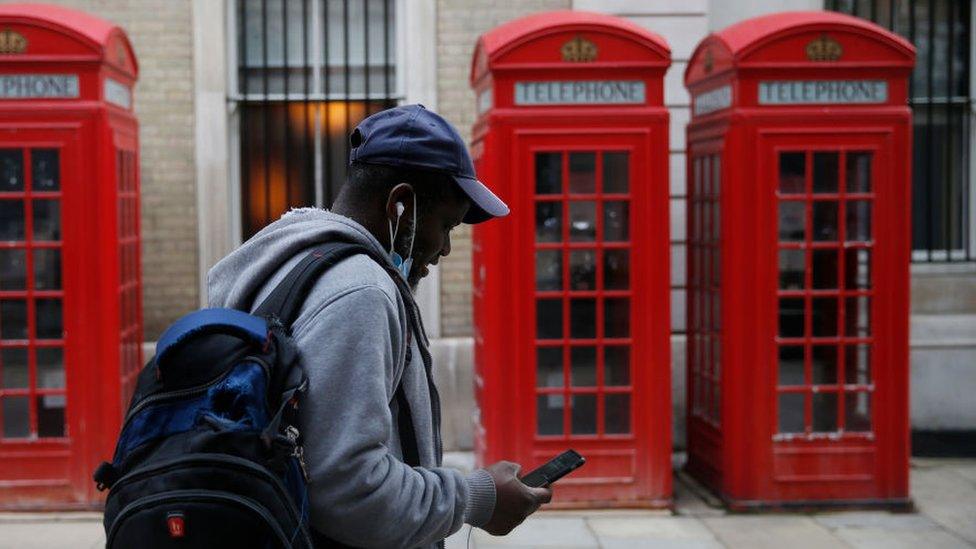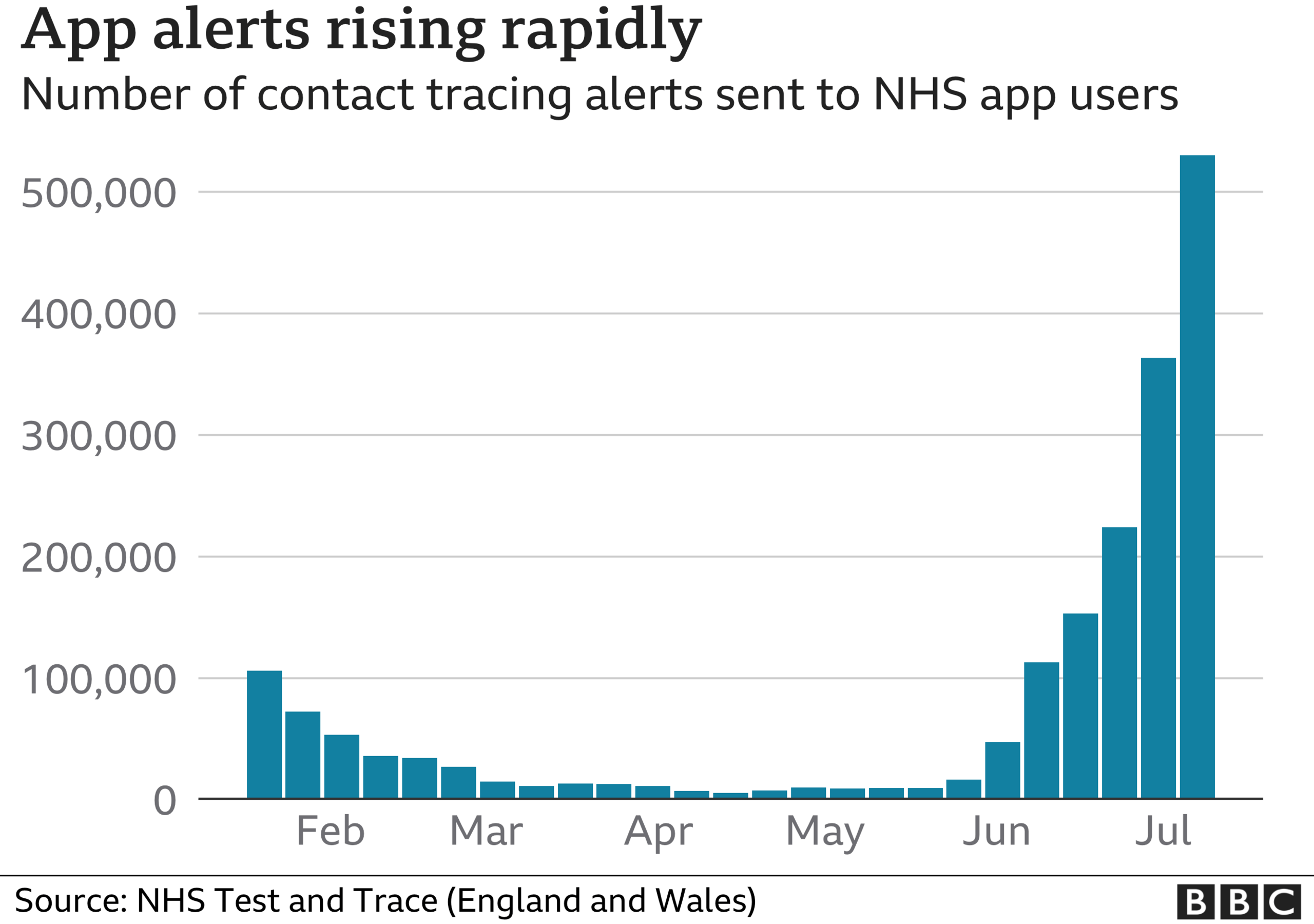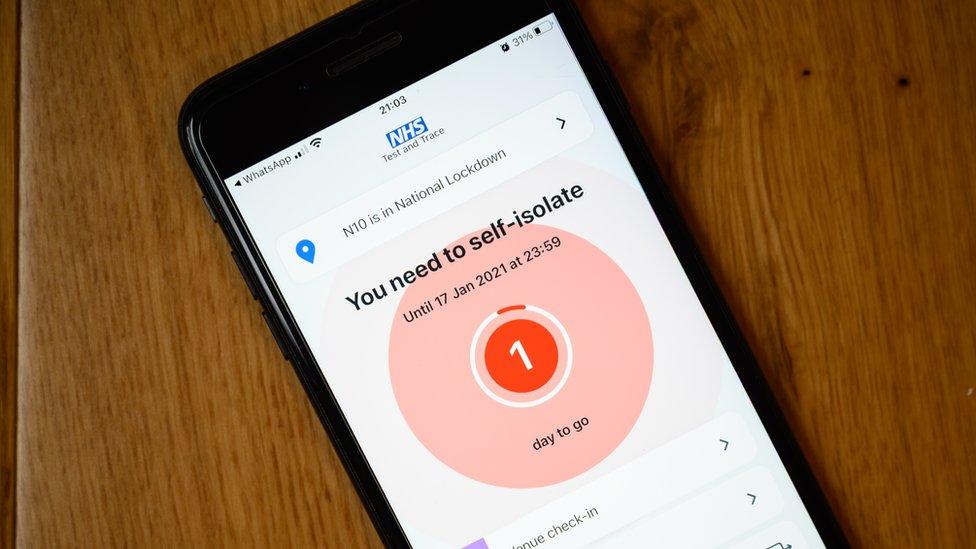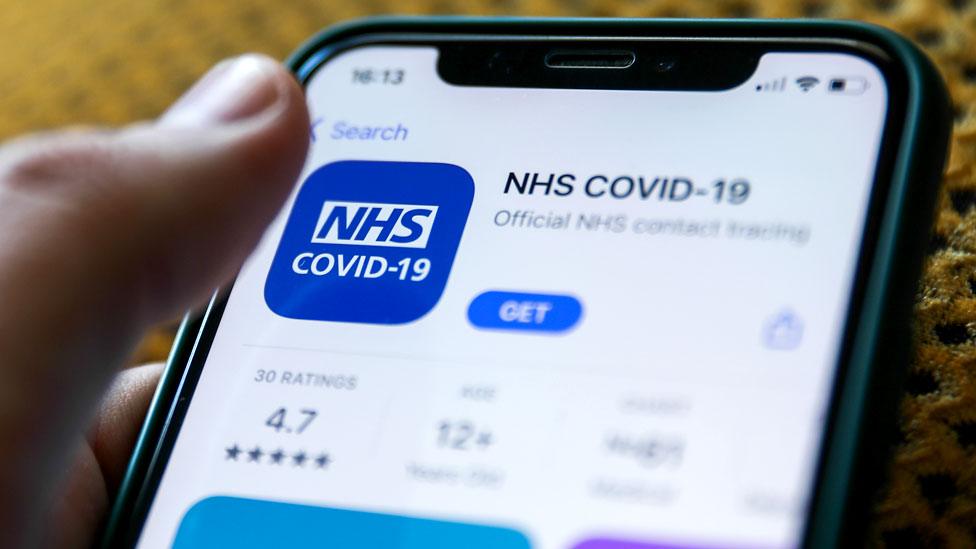Covid: More than 500,000 app pings in a single week
- Published

More than half a million isolation alerts were sent to people using the NHS Covid-19 app in England and Wales during the first week of July.
Some 530,126 alerts telling people to self-isolate were sent in the week to 7 July, a 46% rise on the previous week.
One union has warned factories are on the verge of shutting because of staff shortages, with Nissan and Rolls Royce the latest firms to raise concerns.
The UK has recorded another 48,553 daily coronavirus cases.
Cases have increased 32.6% over the last week. Prime Minister Boris Johnson had previously warned there could be 50,000 cases a day by 19 July - when most legal restrictions are due to end in England.
Latest government figures, external also show a further 63 Covid deaths within 28 days of a positive test.
Alerts are sent through the NHS Covid app to tell individuals they have been in close contact with a positive coronavirus case. Anyone alerted is advised to self-isolate for 10 days.
Social distancing rules are being lifted in England on Monday, leading to concerns about a bigger rise in the number of alerts.
The latest figures show that 520,194 alerts were sent in England in the week to 7 July, with another 9,932 sent in Wales.
'Something has to be done'
Unite said hundreds of employees were off work at some sites, with the app causing "havoc" on production lines.
Assistant general secretary Steve Turner said it was no exaggeration to say factories were on the verge of shutting and that at some sites hundreds of staff are off work.
"It is clear that something has to be done in time for July 19, or else people will simply start deleting the app en masse to avoid isolation notices," he said.
Steve Robinson, chief executive of homecare company Prama, told BBC Radio 4's PM programme that around a quarter of his staff were currently off work after being "pinged".
He said he was currently offering three times the normal salary to cover emergency shifts.
Tim Moran, who runs cold supply chain company Lineage Logistics' UK division, said he had more staff absent than at any point during the pandemic and it meant the firm couldn't meet the demand to deliver food to customers.

Prof Lucy Easthope, who advises the government on disaster planning, said the issue of staff shortages because of the app hadn't come as a surprise.
She told the PM programme: "We feared we would see in some workforces 80% absenteeism. There will come a point where we simply can't operate like that, particularly around things like food production."
She said she knew of some companies advising people not to have the app, which she said was in its "death throes".
"The app is not the way to do this now. It has always been that we should have had local contact tracing through public health and that now needs to be properly resourced."
Despite the rise in the number of people getting "pinged" - data from the most recent week showed the most downloads of the app (342,483) since the seven days to 6 June (393,842).
It has already been announced that from 16 August, people who have been fully vaccinated in England will no longer have to self-isolate after close contact with someone who tests positive.
The BBC has been told the team behind the app has been asked to adjust the measurements that trigger the alerts so that fewer are sent out - although the time frame for the change is not yet known.
However, the Department of Health and Social Care said that while the sensitivity of the app was kept under constant review there were no plans to change its sensitivity at this time.
Other reasons people have to self-isolate include if they test positive, live with someone who tests positive, or are told to do so by contact tracers.

How does the NHS Covid app work?

People in England and Wales can download the NHS Covid app (Northern Ireland and Scotland have their own).
If you are using the app and spend enough time close to another person with it, you will receive a "ping" alert if they later test positive for Covid and share the information with the app. The app uses Bluetooth readings to infer if you had recently been within 2m of them for at least 15 minutes.
If you are "pinged" you're advised - but not legally obliged - to self-isolate for 10 days.

Meanwhile, the UK's two largest supermarkets - Tesco and Sainsbury's - have said they will continue to ask shoppers to wear masks when the legal requirement to do so in England is dropped on Monday.
The government has said it "expects and recommends" shoppers in England to wear face masks from Monday.
But the legal requirement to cover your face in enclosed spaces will end. Different rules apply in the devolved nations.
And the government has been criticised over its decision to add Bulgaria and Croatia to its green travel list from Monday - but not give Foreign Office approval for travel to the countries.
The decision to allow people to travel there without isolating on return was announced on Wednesday, but the government's travel advice pages for both countries currently states that it "advises against all but essential travel".
Government travel advice affects operators' and passengers' insurance.
Airlines UK chief executive Tim Alderslade said not aligning Foreign Office travel advice with government travel policies was causing "huge confusion for passengers and carriers".

"I'VE BEEN ILL FOR EIGHT MONTHS": What is long covid and will I ever get better?
THE EVERYDAY HUSTLE: By Rotation owner Eshita Kabra shares her hustle story

- Published9 July 2021

- Published15 July 2021
